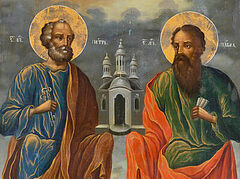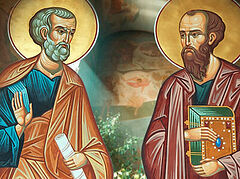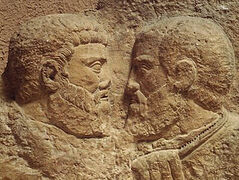Today we glorify the great, Spirit-bearing, God-enlightened Apostles of Christ Peter and Paul—preeminent among the holy Apostles.
And when we look at them with our spiritual eyes, we reverently bow before the greatness of their apostolic labors. They are the executors of the will of God: God ye therefore, and teach all nations… (Mt. 28:19). They are fiery, unshakable preachers of the word of God, courageous fighters for the truth of Christ, fearing neither beatings, nor the martyr’s death that both of them endured—according to ancient tradition—on this day.
The Apostle Peter was crucified; the Apostle Paul was beheaded with a sword.
It would seem to us small and weak sinners that we have nothing to learn from the holy Apostles—it remains only to glorify their exceptional feat in the name of Christ, for we all live in a peaceful state, and we all fulfill our small obedience in the world that the Lord has entrusted to us.
But, my dears, we can and must learn a lot from these great Apostles, not only from their Epistles, portions of which are read at every Divine Liturgy, but directly from their labors, their virtues; we must learn how to protect our immortal souls from sinful temptations, adorn them with spiritual beauty, and stand before the face of God as a faithful child of our Heavenly Father.
And the Apostle Peter was a man. When the Lord our Savior bid farewell to His Disciples at the Mystical Supper on the eve of His suffering, when He told His Disciples that temptations, sorrows, and offenses awaited them, the Apostle Peter exclaimed: Though all men shall be offended because of Thee, yet will I never be offended. But the Lord answered him—and you all know these words of Christ: Verily I say unto thee, That this night, before the cock crow, thou shalt deny Me thrice (Mt. 26:33-34).
And so on Friday morning, when the beaten, exhausted Savior was in need of encouragement and consolation according to His humanity, and when the devotion of the Apostle Peter and his fidelity in love could have given this consolation, at these moments the Apostle Peter was responding to the maid who said: Thou also wast with Jesus of Nazareth, by denying Him thrice out of fear: I know not this man of Whom you speak (Mk. 14:66-72). He renounced Him with an oath, three times!
Such was the depth of the Apostle Peter, not yet renewed by the grace of the Holy Spirit! He was still an ordinary man with his infirmities, with his weaknesses, and he fell.
His rebellion was short-lived. As soon as the Lord our Savior looked at the Apostle Peter in these moments, Peter remembered the word of Jesus, which said unto him and felt the full weight of the sin he had committed and wept bitterly, as the holy Evangelist says (Mt. 26:75). This weeping over his sins, always salvific for every sinner, drew the mercy of the Savior. The Lord forgave His repentant Apostle and restored him to apostolic dignity, which he had fallen away from by renouncing the Lord.
You have heard during the moleben, the singing of the Gospel words about how the Savior, appearing after the Resurrection, thrice asked the Apostle Peter: Lovest thou Me? And receiving his passionate answers: Thou knowest that I love Thee, the Lord told him three times: Feed My lambs … Feed My sheep (Jn. 21:15-17). The Lord entrusted him to feed His rational flock, to carry out His Divine will and to organize the holy Church of Christ on Earth.
And as the oldest tradition says, the already forgiven Apostle Peter continued to remember his grave fall and every night, as soon as heard the rooster’s call, would rouse himself, arise in prayer, and tears would flow from his eyes. Two grooves formed under his eyes from these tears.
My dears, don’t we also renounce the Lord? Is not failing to fulfill the commandments of God also a renunciation of our Savior?
After all, all of us, through the mouths of our Godparents, promised in Holy Baptism to unite ourselves to Christ, to live with Christ; and we have repeated the promise to be faithful to our Lord many times when we have repented and approached the holy chalice of Christ!
And if we continue to live in a filthy manner, if we continue to bear malice, to condemn, to slander, to get angry, to curse, to defile ourselves with lust, not fulfilling the will of God to protect our mouths and hearts from all filth, are we not thereby betraying our Lord?
And let the example of the Apostle Peter, of his quick realization of his fall and his tearful repentance, inspire us, the weak and infirm, who fall every minute into sin, to see our transgressions and be able to weep for them before the face of Him Whom we offend with our self-will.
We also have before us the holy Apostle Paul, known as Saul before his conversion. You know that he was a persecutor of Christians. Out of his blind zeal for observing the Jewish Law, he harassed Christians and helped persecute them, throwing them into prison. But when he came to see with his spiritual eyes, after the miracle of the appearance of the Lord that happened to him, and when he became the Apostle Paul, he surpassed the other Apostles with his zeal for fulfilling the apostolic labor.
How many times he was beaten with sticks, stoned, imprisoned, and suffered shipwrecks! But nothing could stop him in his fiery preaching about the Lord, to Whom he gave himself with all his heart. Wherever he went in his travels, he opened his mouth and preached the name of God. When he was persecuted, he would move to another city, not resting a single day, devoting himself entirely to glorifying the name of God. And he became great, and preeminent, and a glorious Apostle of Christ, whom the entire Orthodox world reveres; whose name, like that of the Apostle Peter, will be exalted and glorified in the holy Church of Christ unto the end of the age.
And listen, dear ones, to the words of this great Apostle, Paul: O wretched man that I am! who shall deliver me from the body of this death (Rom. 7:24); I … am not meet to be called an Apostle, because I persecuted the Church of God (1 Cor. 15:9). He always retained the memory that in his younger days he had committed the serious sin of persecuting Christians; this memory inflamed his soul even later when thanks to his many labors in the name of Christ he was already famous throughout the whole known world.
Learn humility from the holy Apostle Paul! He regards all his labors in the name of Christ and all his glory as nothing, remembering his sinful fall.
We all need to see our many defilements and be humble before the face of the Lord, aware of ourselves as sinners, disobedient to the will of God. We also need to be humble before each other, not exalting ourselves above others—though there may be external, earthly reasons for it—because every one of us is sinful.
And in the name of what did the holy Apostles Peter and Paul carry out their heavy apostolic labors? In the name of love for their Lord and Savior and in the name of love for men; for they preached the word of God that men might be saved, that immortal souls might not perish for all eternity; but aroused by the words of their preaching, they might prepare themselves for the eternal blessed Kingdom. Such was the power of their love for men!
St. John Chrysostom says about the Apostle Paul: “I cannot find the words to describe how the heart of this great Apostle burned with love for men. His love was deeper than the ocean; it was brighter and hotter than any fire.” He loved men as though he were their own father or mother who gave birth to them. Moreover, he was even ready to be excommunicated from the Lord if only those to whom he preached might be saved. Let his own soul perish, but let those people whom he called to salvation be saved—that’s what he said himself!
What love! How it burst forth like a flame from his burning heart—a heart that, as he himself says, had room for everyone, that embraced all people, that loved all people with extraordinary love (cf. 2 Cor. 6:11-12)! And this love of the Apostle, such a loving heart lifted him to an unattainable height of greatness and holiness.
Oh, my dears, if only the heart of every one of us had but a grain of such love for others! Oh, if only our love for each other, willed by the Lord, would keep our mouths, our hearts, our steps, our hands and feet from all kinds of filth!
After all, such love saves an immortal soul for eternity, for the Lord said that the commandment of love is the greatest; whoever fulfills it, whoever nurtures his heart in such love for others, fulfills the entire law of Christ (cf. Mk. 12:29-31).
Look what else: The Lord Jesus Christ called the Apostle Peter to follow Him when he and his brother were fishing in the Sea of Tiberias. The Lord called the Apostle Paul in a miraculous manner: first by blinding him, so his spiritual eyes could see, and then by giving him the spiritual vision with which the Apostle Paul saw his sin and came to know all the sweetness of being a servant of his Lord and Savior.
And the Lord calls us to Himself in various ways: by His quiet voice with which He speaks in the conscience of every one of us, and with miraculous phenomena and special events in our lives.
Often, quite unexpectedly, we feel the quiet voice of God: “Wake up; come to your senses; you are standing on the edge of a sinful abyss, and death is not far from you.”
Sometimes the Lord shocks us with some special event to turn us to Himself, to remind our sinful hearts that the Lord is over us and that we are all headed towards the threshold of death, which we will cross over into eternal life.
Don’t we know how wars have roused many who were weak in faith or had no faith at all?!
Others the Lord will strike with sorrow, so that in this sorrow they might remember that they are sinful before the Lord, that they have departed from the Lord, and that the Lord wants to thereby wake them from this spiritual slumber they were in before their grief.
The Lord calls us to Himself in different ways, but the purpose of the call—both the one with which He called the Apostles Peter and Paul and the one with which He calls every one of us—is the same: to entice us to follow Him unto the end of our days on Earth.
The Lord calls to eternal salvation, to which the holy Apostle Paul, called us preaching the will of God when he said in his Epistle: Work out your own salvation with fear and trembling (Phil. 2:12). The holy Apostle Peter also preached about this, in squares and in churches, in houses and on the streets, because the Lord commanded the Apostles to preach the Gospel to every creature (Mk. 16:15).
Take another look at the holy Apostles. The Apostle Peter was a family man—he had children; his mother-in-law lived with him. The holy Apostle Paul was a virgin. The Apostle Peter was a commoner; the Apostle Paul was an educated man. All are equal before the Lord. The Lord draws both the learned and the simpleton to Himself; both the married and the unmarried.
And all of us, different in appearance, in age, are all the same children of our Heavenly Father. We all have an immortal soul, which the Savior calls us to save; and the holy Apostles call us.
I am a bishop and you are laymen. We all have our own earthly labor, whether in a family or at work. Some of us are old, some are young; but as it says in one of the sacred funeral hymns, we all stand in equal rank before the face of our Heavenly Father. Our Heavenly Judge and Father will ask every one of us only about how we spent our time on Earth, how we saved our immortal soul, whether we listened to the voice with which the Lord calls us from the abyss of sin to eternal salvation, and whether we responded to this voice.
The holy Apostles Peter and Paul dedicated themselves to this work of saving men. And let us, my dears, on their bright feast, on the day of their martyrdom, hear in our hearts their calls to eternal salvation, to strong faith, to true love, not hypocritical, to which they called the rational flock in the days of their earthly labors and to which they continue to call all of us through their epistles.
And let us, weak and sinful, relying on their prayers, traverse our earthly path with the constant memory of the sacred duty placed upon each of us—to be worthy children and disciples of our Savior.




